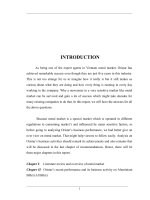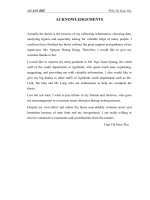Pointers and Strings
Bạn đang xem bản rút gọn của tài liệu. Xem và tải ngay bản đầy đủ của tài liệu tại đây (191.75 KB, 48 trang )
2003 Prentice Hall, Inc. All rights reserved.
1
Chapter 5 - Pointers and Strings
Outline
5.1 Introduction
5.2 Pointer Variable Declarations and Initialization
5.3 Pointer Operators
5.4 Calling Functions by Reference
5.5 Using const with Pointers
5.6 Bubble Sort Using Pass-by-Reference
5.7 Pointer Expressions and Pointer Arithmetic
5.8 Relationship Between Pointers and Arrays
5.9 Arrays of Pointers
5.10 Function Pointers
5.11 Introduction to Character and String Processing
5.11.1 Fundamentals of Characters and Strings
5.11.2 String Manipulation Functions of the String-
Handling Library
2003 Prentice Hall, Inc. All rights reserved.
2
Pointer Variable Declarations
and Initialization
• Pointer variables
– Contain memory addresses as values
– Normally, variable contains specific value (direct reference)
– Pointers contain address of variable that has specific value
(indirect reference)
• Indirection
– Referencing value through pointer
• Pointer declarations
– * indicates variable is pointer
int *myPtr;
declares pointer to int, pointer of type int *
– Multiple pointers require multiple asterisks
int *myPtr1, *myPtr2;
count
7
countPtr
count
7
2003 Prentice Hall, Inc. All rights reserved.
3
Pointer Variable Declarations and
Initialization
• Can declare pointers to any data type
• Pointer initialization
– Initialized to 0, NULL, or address
• 0 or NULL points to nothing
2003 Prentice Hall, Inc. All rights reserved.
4
Pointer Operators
• & (address operator)
– Returns memory address of its operand
–Example
int y = 5;
int *yPtr;
yPtr = &y; // yPtr gets address of y
– yPtr “points to” y
yPtr
y
5
yptr
500000 600000
y
600000 5
address of y
is value of
yptr
2003 Prentice Hall, Inc. All rights reserved.
5
Pointer Operators
• * (indirection/dereferencing operator)
– Returns synonym for object its pointer operand points to
– *yPtr returns y (because yPtr points to y).
– dereferenced pointer is lvalue
*yptr = 9; // assigns 9 to y
• * and & are inverses of each other
2003 Prentice Hall, Inc.
All rights reserved.
6
3 #include <iostream>
5 using std::cout;
6 using std::endl;
8 int main() {
10 int a; // a is an integer
11 int *aPtr; // aPtr is a pointer to an integer
13 a = 7;
14 aPtr = &a; // aPtr assigned address of a
16 cout << "The address of a is " << &a
17 << "\nThe value of aPtr is " << aPtr;
19 cout << "\n\nThe value of a is " << a
20 << "\nThe value of *aPtr is " << *aPtr;
22 cout << "\n\nShowing that * and & are inverses of "
23 << "each other.\n&*aPtr = " << &*aPtr
24 << "\n*&aPtr = " << *&aPtr << endl;
26 return 0; // indicates successful termination
28 } // end main
The address of a is 0012FED4
The value of aPtr is 0012FED4
The value of a is 7
The value of *aPtr is 7
Showing that * and & are inverses of each other.
&*aPtr = 0012FED4
*&aPtr = 0012FED4
2003 Prentice Hall, Inc. All rights reserved.
7
Calling Functions by Reference
• 3 ways to pass arguments to function
– Pass-by-value
– Pass-by-reference with reference arguments
– Pass-by-reference with pointer arguments
• return can return one value from function
• Arguments passed to function using reference arguments
– Modify original values of arguments
– More than one value “returned”
• Pass-by-reference with pointer arguments
– Simulate pass-by-reference
• Use pointers and indirection operator
– Pass address of argument using & operator
– Arrays not passed with & because array name already
pointer
– * operator used as alias/nickname for variable inside of
function
2003 Prentice Hall, Inc.
All rights reserved.
8
4 #include <iostream>
6 using std::cout;
7 using std::endl;
9 void cubeByReference( int * ); // prototype
11 int main() {
13 int number = 5;
15 cout << "The original value of number is " << number;
17 // pass address of number to cubeByReference
18 cubeByReference( &number );
20 cout << "\nThe new value of number is " << number << endl;
22 return 0; // indicates successful termination
24 } // end main
26 // calculate cube of *nPtr; modifies variable number in main
27 void cubeByReference( int *nPtr ) {
29 *nPtr = *nPtr * *nPtr * *nPtr; // cube *nPtr
31 } // end function cubeByReference
The original value of number is 5
The new value of number is 125
2003 Prentice Hall, Inc. All rights reserved.
9
Using const with Pointers
• const qualifier
– Value of variable should not be modified
– const used when function does not need to change a variable
• Principle of least privilege
– Award function enough access to accomplish task, but no more
• Four ways to pass pointer to function
– Nonconstant pointer to nonconstant data
• Highest amount of access
– Nonconstant pointer to constant data
– Constant pointer to nonconstant data
– Constant pointer to constant data
• Least amount of access
2003 Prentice Hall, Inc.
All rights reserved.
10
4 #include <iostream>
6 using std::cout; using std::endl;
9 #include <cctype> // prototypes for islower and toupper
11 void convertToUppercase( char * );
13 int main() {
15 char phrase[] = "characters and $32.98";
17 cout << "The phrase before conversion is: " << phrase;
18 convertToUppercase( phrase );
19 cout << "\nThe phrase after conversion is: "
20 << phrase << endl;
22 return 0; // indicates successful termination
24 } // end main
26 // convert string to uppercase letters
27 void convertToUppercase( char *sPtr ) {
29 while ( *sPtr != '\0' ) { // current character is not '\0'
31 if ( islower( *sPtr ) ) // if character is lowercase,
32 *sPtr = toupper( *sPtr ); // convert to uppercase
34 ++sPtr; // move sPtr to next character in string
36 } // end while
38 } // end function convertToUppercase
The phrase before conversion is: characters and $32.98
The phrase after conversion is: CHARACTERS AND $32.98
2003 Prentice Hall, Inc.
All rights reserved.
11
2 // Printing a string one character at a time using
3 // a non-constant pointer to constant data.
4 #include <iostream>
6 using std::cout; using std::endl;
9 void printCharacters( const char * );
11 int main() {
13 char phrase[] = "print characters of a string";
15 cout << "The string is:\n";
16 printCharacters( phrase );
17 cout << endl;
19 return 0; // indicates successful termination
21 } // end main
23 // sPtr cannot modify the character to which it points,
24 // i.e., sPtr is a "read-only" pointer
25 void printCharacters( const char *sPtr ) {
27 for ( ; *sPtr != '\0'; sPtr++ ) // no initialization
28 cout << *sPtr;
30 } // end function printCharacters
The string is:
print characters of a string
2003 Prentice Hall, Inc.
All rights reserved.
12
2 // Attempting to modify data through a
3 // non-constant pointer to constant data.
5 void f( const int * ); // prototype
7 int main() {
9 int y;
11 f( &y ); // f attempts illegal modification
13 return 0; // indicates successful termination
15 } // end main
17 // xPtr cannot modify the value of the variable
18 // to which it points
19 void f( const int *xPtr ) {
21 *xPtr = 100; // error: cannot modify a const object
23 } // end function f
d:\cpphtp4_examples\ch05\Fig05_12.cpp(21) : error
C2166:
l-value specifies const object
2003 Prentice Hall, Inc. All rights reserved.
13
Using const with Pointers
• const pointers
– Always point to same memory location
– Default for array name
– Must be initialized when declared
2003 Prentice Hall, Inc.
All rights reserved.
14
1 // Fig. 5.13: fig05_13.cpp
2 // Attempting to modify a constant pointer to
3 // non-constant data.
5 int main() {
7 int x, y;
9 // ptr is a constant pointer to an integer that can
10 // be modified through ptr, but ptr always points to the
11 // same memory location.
12 int * const ptr = &x;
13 //but if int const *ptr=&x then line 15 is error
14 //and line 16 is not error
15 *ptr = 7; // allowed: *ptr is not const
16 ptr = &y; // error: ptr is const; cannot assign new address
17 return 0; // indicates successful termination
18 } // end main
d:\cpphtp4_examples\ch05\Fig05_13.cpp(15) : error
C2166:
l-value specifies const object
2003 Prentice Hall, Inc.
All rights reserved.
15
2 // Attempting to modify a constant pointer to constant data.
3 #include <iostream>
5 using std::cout;
6 using std::endl;
8 int main() {
10 int x = 5, y;
12 // ptr is a constant pointer to a constant integer.
13 // ptr always points to the same location; the integer
14 // at that location cannot be modified.
15 const int *const ptr = &x;
17 cout << *ptr << endl;
19 *ptr = 7; // error: *ptr is const; cannot assign new value
20 ptr = &y; // error: ptr is const; cannot assign new address
22 return 0; // indicates successful termination
24 } // end main
d:\cpphtp4_examples\ch05\Fig05_14.cpp(19) : error
C2166:
l-value specifies const object
d:\cpphtp4_examples\ch05\Fig05_14.cpp(20) : error
C2166:
l-value specifies const object
2003 Prentice Hall, Inc. All rights reserved.
16
Bubble Sort Using Pass-by-Reference
• Implement bubbleSort using pointers
– Want function swap to access array elements
• Individual array elements: scalars
– Passed by value by default
• Pass by reference using address operator &
2003 Prentice Hall, Inc.
All rights reserved.
17
2 // This program puts values into an array, sorts the values into
3 // ascending order, and prints the resulting array.
4 #include <iostream>
5 #include <iomanip>
6 using std::cout; using std::endl; using std::setw;
13 void bubbleSort( int *, const int ); // prototype
14 void swap( int * const, int * const ); // prototype
16 int main() {
18 const int arraySize = 10;
19 int a[ arraySize ] = { 2, 6, 4, 8, 10, 12, 89, 68, 45, 37 };
21 cout << "Data items in original order\n";
23 for ( int i = 0; i < arraySize; i++ )
24 cout << setw( 4 ) << a[ i ];
26 bubbleSort( a, arraySize ); // sort the array
28 cout << "\nData items in ascending order\n";
30 for ( int j = 0; j < arraySize; j++ )
31 cout << setw( 4 ) << a[ j ];
33 cout << endl;
35 return 0; // indicates successful termination
37 } // end main
2003 Prentice Hall, Inc.
All rights reserved.
18
39 // sort an array of integers using bubble sort algorithm
40 void bubbleSort( int *array, const int size ) {
42 // loop to control passes
43 for ( int pass = 0; pass < size - 1; pass++ )
45 // loop to control comparisons during each pass
46 for ( int k = 0; k < size - 1; k++ )
48 // swap adjacent elements if they are out of order
49 if ( array[ k ] > array[ k + 1 ] )
50 swap( &array[ k ], &array[ k + 1 ] );
52 } // end function bubbleSort
54 // swap values at memory locations to which
55 // element1Ptr and element2Ptr point
56 void swap( int * const element1Ptr, int * const element2Ptr ) {
58 int hold = *element1Ptr;
59 *element1Ptr = *element2Ptr;
60 *element2Ptr = hold;
62 } // end function swap
Data items in original order
2 6 4 8 10 12 89 68 45 37
Data items in ascending order
2 4 6 8 10 12 37 45 68 89
2003 Prentice Hall, Inc. All rights reserved.
19
Bubble Sort Using Pass-by-Reference
• sizeof
– operator returns size of operand in bytes
–For arrays,sizeof returns
( size of 1 element ) * ( number of elements )
–If sizeof( int ) = 4, then
int myArray[10];
cout << sizeof(myArray);
will print 40
• sizeof can be used with
– Variable names
– Type names
– Constant values








